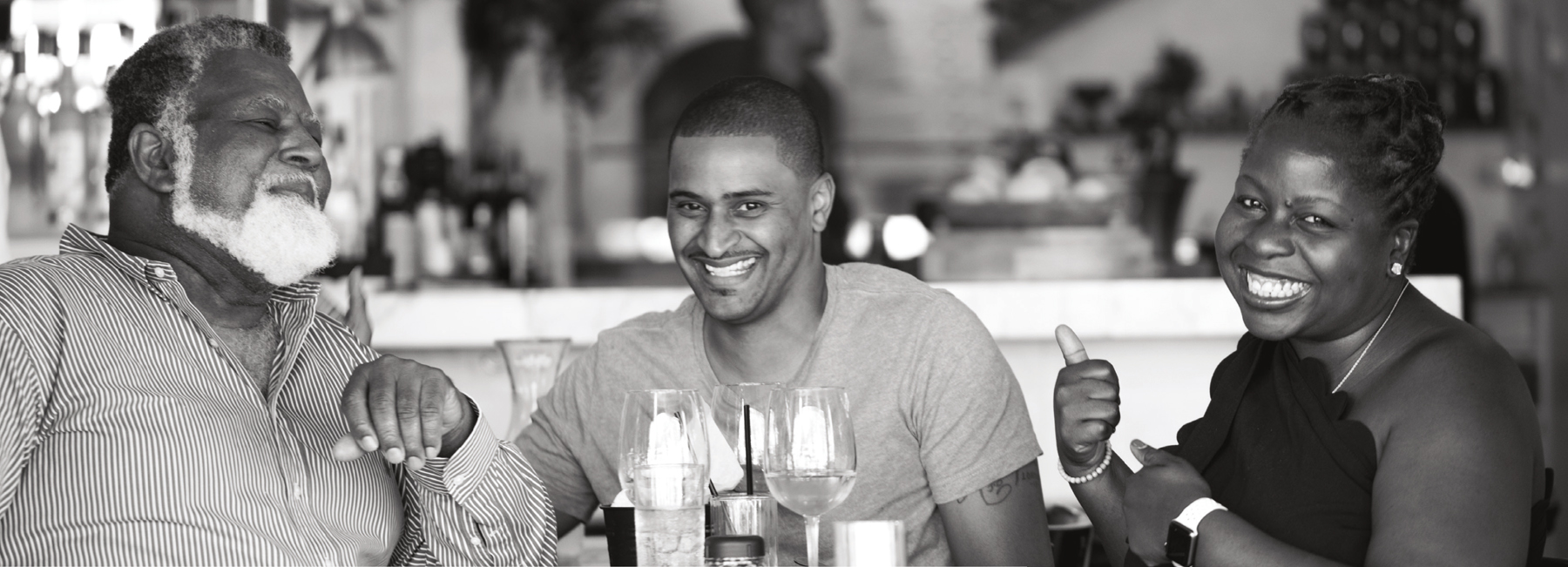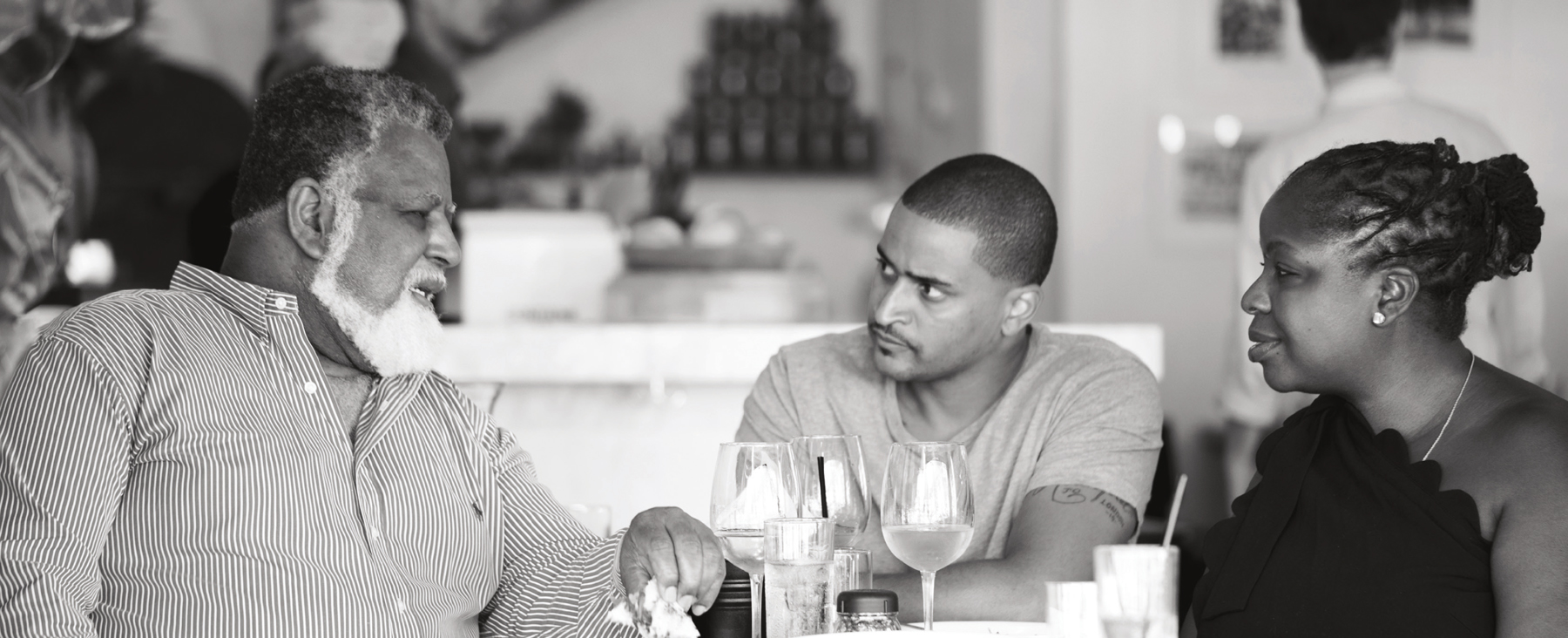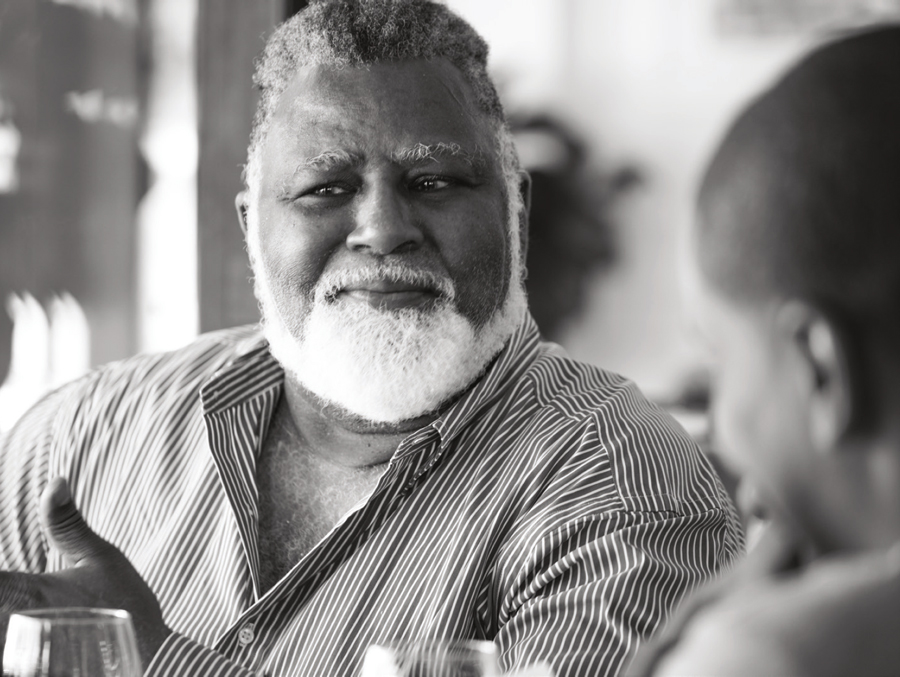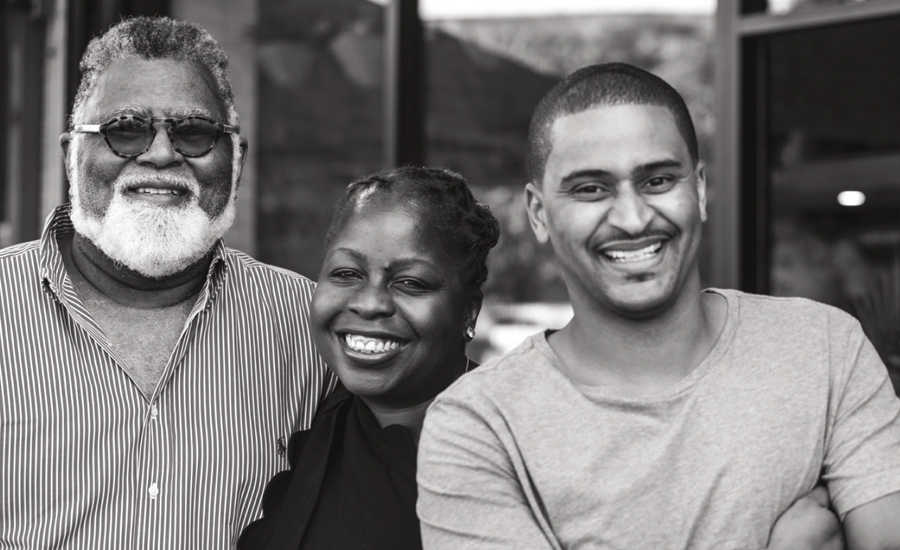

VERONICA: I can’t even remember the first time I met Alexander. He’s been in my life since the days of Cafe Beulah, and I knew about him through mutual friends like the artist Lorna Simpson and Studio Museum director Thelma Golden.
But I distinctly remember the first day I went to Minton’s to meet JJ. I was wearing a red shirt, denim shorts, and some red heels. I thought, not a big deal.
Then I got up to Harlem, I was waiting outside because I was a little early. This car full of guys rolls by, and they call out, “Oh, you’re so dressed up!” I thought Okay. Didn’t think so, but okay.
Then a woman walked by and she said, “I like the way you matched your top with your shoes.”
Then a few minutes later, an older woman walked by and she said, “Now, ain’t your hair pretty?”
I was so struck that in the course of five minutes, I’d interacted with all of thesetotal strangers and they’d been so warm and complimenting. It was so unexpected.
ALEXANDER: Welcome to Harlem.
VERONICA: Yes. Welcome to Harlem!
JJ: That’s what I was about to say,“Welcome to Harlem.”
VERONICA: I had worn that outfit a thousand times that summer downtown, and nobody said nothing. But the love in Harlem was immediate and real. When I’ve been away from Harlem for a little while, I forget about the warmth, about the way people interact, the way that they break down boundaries that exist in other places.
ALEXANDER: Let me say this, as a precursor. Harlem made such an impression on my father before he married my mother, that when I was a kid growing up, he would tell Harlem stories to me every Sunday morning on the side porch.
VERONICA: Wow.
ALEXANDER: Harlem was the magic city, and I came to New York with these preconceived ideas about a dressed-up place, uptown somewhere in Manhattan, where black folks shine. It was like being in the South, but you’re in the North with sophistication.
VERONICA: It’s like that saying from the 1920s, I’d rather be a lamppost in Harlem than the governor of Georgia.
ALEXANDER: In Harlem, everybody dressed. It was almost like a private circle of people who dressed for each other and inspired each other. So, coming to Harlem, and giving presence to what you just said, folks in Harlem understand style; they appreciate when people go beyond just the usual, and those elements are part of the language and communication. You’ll start a conversation with somebody just because you admire their shoes. I mean, nothing breaks the ice better, because there’s this incredible appreciation for people who put on the dog, go a little extra.
JJ: There is this presence of being in Harlem. You’re supposed to be the finest all the time. You never are supposed to let your guard down. You make sure you have creases in your pants. That is what I used to get screamed at about. I still get screamed at about that from Alexander—not having creases in my pants.
ALEXANDER: Dressing well is really Harlem. On Sundays, I remember I used to love to go to the House of Prayer because I’d want to be sitting right there when the church was let out, and there’d be the parade of festive colors, and textures, and hats, and gloves, and spit-shined shoes, and two-and three-button vests. Laid out to perfection. This is the community of Harlem.
VERONICA: JJ, could you talk a little bit about the area, because you were living in Harlem before you started working at The Cecil and Minton’s, right?
JJ: My aunts lived in Harlem, my grandmother lives in Harlem, everybody lived in Harlem. Not knowing I would ever cook in Harlem. Harlem is always a jumping, cultural conversation place. If you say hello to somebody, people say hello back. It was one of the few places in New York City that reminded me of home like the Poconos. You walk into a store, and everybody says hello to you.
ALEXANDER: That is how Harlem is. Somebody always said hello to you, always said good morning. Nobody just walked by you or bumped you on the street like everybody knows New York to be.

JJ: When I would walk to work from where I live, that same old lady would say hello to me in the morning or wave to me from the window on my way to work. Sometimes, somebody stops me in the street or a doorman flags me down to say, “I read about you in the newspaper. Keep up the good work.” There is always that sense of support and community. That is why I feel it is the greatest community in the world.
VERONICA: Alexander, when you were thinking about this venture with Mr. Parsons, did you know that people would want to stop by on their way home from work, want to have their first dates here, want to meet up on Sunday? Did you know how the restaurant would live in the community?
ALEXANDER: In a way I did, because Harlem is just a mirror reflection of a Southern town.
VERONICA: Can you say more about that? Preferably while somebody brings me more of your famous mac and cheese?
ALEXANDER: All of those practices and rituals and sort of customs and traditions observed in Harlem came from mostly the Carolinas. It came from the southern migration. Harlem was always just a bigger Southern town in the North.
This was the first time for me to open a restaurant north of 42nd Street … I had never had a restaurant in Harlem, and I knew it would be different because I also knew how African Americans responded to my other restaurants that were downtown. For example, I knew on Sunday I was going to get a larger grouping of African Americans who saw my restaurant on 19th and Park as a destination, because when black folks are dressed, they are ready to go somewhere.
VERONICA: That’s the double truth, Ruth.
ALEXANDER: You know, church gets you ready but then you got the rest of the day. It’s only one o’clock. We got to go somewhere, and we did the same thing in the South. Part of it was the Sunday parade of people who would just kind of walk around so they could show off their outfits.
VERONICA: Right. JJ, could you talk a little bit about what Sunday in the restaurant was like?

JJ: Like Alexander said, people are coming from church, and they are really showing off. It just happens that we’d have jazz playing in Minton’s, so it really keeps that church spirit going. It’s packed, and everybody from Grandma and Grandpa to the little kids are really dressed up while they are eating.
VERONICA: You talked about the intergenerational diners. Are there dishes that kids love as much as the grandparents do? Are there some dishes you just think are universal in families?
JJ: I think a universal dish is the cinnamon-scented guinea hen. They will tell their kids, “Oh, it’s just like fried chicken.”
VERONICA: Right.
JJ: They do love cinnamon, so they kind of trick them and then later on say, “You know you ate guinea hen when you were eight years old?” Or you get those sophisticated eaters like your daughter who comes in, Veronica. Kids like your daughter just want to try something new or they love wild striped bass or they like a bowl of spicy black beans. They know how to relate to the dishes. They might not know the history, but they understand some of the flavors.
ALEXANDER: On Sundays, Dandy Wellington comes in dressed to the nine, him and his band every Sunday. Three vests, two coats, a hat, a sweater.
VERONICA: Wow. His name is Dandy Wellington?
ALEXANDER: Yes, he is quite an icon on the New York scene.
VERONICA: Nice. So let’s talk about music. What to you is the soundtrack of Harlem?
JJ: Alexander is way better than me about music. I think of Afro beats, I think of ’90s hip-hop. Lauryn Hill is always playing in the streets of Harlem somewhere.
VERONICA: That’s great. How about for you, Alexander, what are the songs and artists that seem to you iconic to Harlem and to the restaurant?

ALEXANDER: Iconic to Harlem, anything Nina Simone. Sort of Nina Simone meets Miles Davis. Those sounds, that style, is what the Harlem music scene is based on. Dizzy Gillespie, Monk, you know, that kind of encompasses not only the period music but also that music that was the foundation for bebop, which is what Minton’s is all about. The great Motown sound, Otis Redding and Sam Cooke. All of those things to me kind of set the table for Harlem music, both Renaissance and what has been sort of graduating to what is contemporary. (ALEXANDER CONTINUES) When I think of Afro-Asian-American cooking, I think of a more global expression of music. Like JJ said, Afro-pop but also Felt and Afro-Cuban and Brazilian music, a lot of the music of Bahia, the pressing of drums, the sounds of Jamaica, all of those Caribbean drums, steel drums.
VERONICA: I love that. I want to ask you guys, if you were hosting your ideal dinner party, uptown, in Harlem? Let’s say the two of you can invite anyone to dinner, who would you invite and what would you serve?

ALEXANDER: I would have the same guests. You go first, JJ, because you know we wouldn’t have the same guests.
VERONICA: Oh, yes, okay. Let’s start with JJ.
JJ: If I could invite anybody, I would invite my grandmother, who is no longer here, because I think she would adore and love this experience that Alexander created with my help here. Barack Obama and Michelle, of course, because we haven’t had them yet. I would say world leaders that really respect culture, and I am trying to think of one. I would definitely say Stevie Wonder.
VERONICA: That sounds like a dinner I’d like to go to.
ALEXANDER: So, let me tell you about my dinner party.
VERONICA: Yes, please.
ALEXANDER: Are you ready?
ALEXANDER: You know, because I gave it some thought.
JJ: I can only imagine who you are going to say now.
ALEXANDER: I know, right? Well, you said one of my people already. But, I would have a dinner party with Toni Morrison, James Baldwin, Barack Obama, Nina Simone, Langston Hughes, Leontyne Price … and Abe Lincoln.
VERONICA: Wow!
JJ: Abe Lincoln?
ALEXANDER: Abe Lincoln.
VERONICA: Bring it on, Abe!
ALEXANDER: Bring it on! The Gettysburg Address got him invited.
VERONICA: I love that. What would you serve?
JJ: What wouldn’t we serve, right Alexander?
ALEXANDER: Right. Most notable: she-crab soup with sweet corn fritters.
VERONICA: Yum.
ALEXANDER: Shrimp gumbo and banana pudding pie.
JJ: I’ll make all the drinks.
ALEXANDER: [laughs] You get to make mint juleps.
VERONICA: Okay, I love that, and I want to be on that guest list.
ALEXANDER: Alrighty.
VERONICA: I wanted to ask, what is your favorite time of day in Harlem and what is your favorite table in the restaurant?
JJ: I can answer Alexander’s favorite table. My favorite time of day in Harlem is the morning, because you really see the culture of the people that live in Harlem.
VERONICA: By morning, you mean what time?
JJ: Between like eight and ten. The streets are full, the kids are going to school, the parents are dropping them off, people are getting on the train, people are getting ready to go downtown, and it is really full of life and culture. My favorite table in the restaurant, I would say, underneath the Geisha … What is that, forty-two—no, fifty-two?
ALEXANDER: No, that is fifty-nine.
JJ: So then I can see everyone with my back to the window. Fifty-nine, yes.
VERONICA: That is your favorite table?
JJ: Yes, because I can sit there and literally see it all. The whole restaurant. How people eat, who’s walking in, who’s walking out, who looks happy, who looks sad, and I can really see it all sitting there.
VERONICA: But you don’t sit down. I notice that when I come in the restaurant.
JJ: No, that is just respect to everyone that is working. When I am working, I don’t sit down. When I come in with friends or family or just to check out the food and the service, that’s where I like to sit.
VERONICA: Okay. Alexander, what is your favorite table in the restaurant, and what is your favorite time of day in Harlem?
ALEXANDER: I created seventeen as my favorite table, and it became everybody else’s.
VERONICA: Everybody wants to be where you are, Alexander.
ALEXANDER: Including Dick Parsons. Table seventeen.
VERONICA: Why is it your favorite?
ALEXANDER: It is kind of in an alcove. I like spaces where there is nothing on one side of me. It is like a little nook. It’s really like an L-shaped kind of seating.
VERONICA: Right, I love it. What is your favorite time of day in Harlem?

ALEXANDER: My favorite time of day in Harlem is between five and seven a.m.
VERONICA: Why is that?
ALEXANDER: The city is just starting to wake up. I love that. I love feeling like I am part of something new that is about to happen. I like to get out before when JJ was saying when the city is alive and people are going to school and going to work. I am done by then.
JJ: You are done by then! Well, you wake up at like four thirty in themorning. People are getting in fromthe club and you are waking up.
ALEXANDER: The point is, by seven, seven thirty a.m., the city is no longer mine. In that little moment, that time of day, it is all mine. I love that. I really do.